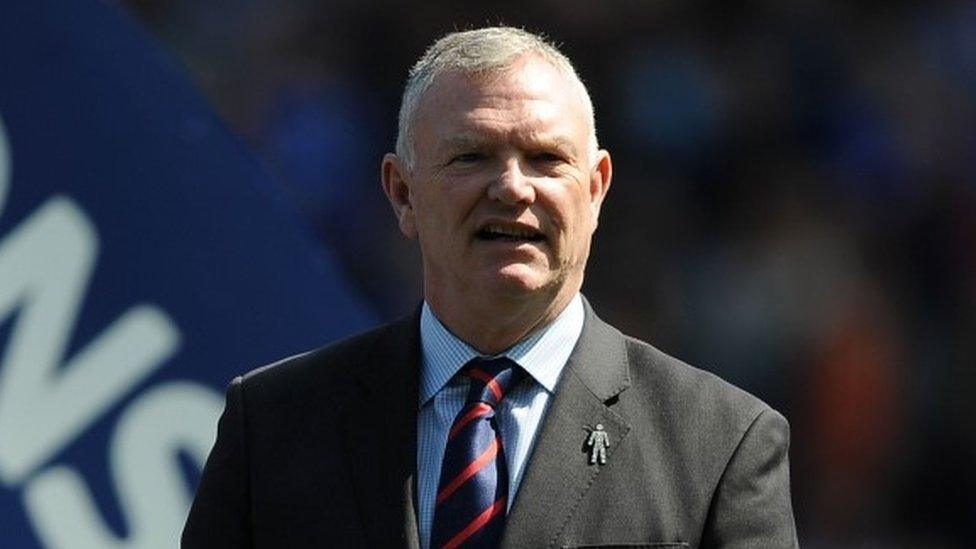FA 'pulled all funding' from child protection project
- Published

The Football Association scrapped a flagship project meant to ensure children were being protected from sexual abuse, the BBC's Victoria Derbyshire programme has learned.
In 2003, the FA pulled all funding from a major review of its child protection policies, three years early.
An evaluation of the project later suggested some FA staff had also been bullied into not talking.
The FA said it could not comment due to a new review into sex abuse.
It has instructed independent leading counsel Kate Gallafent QC to oversee an internal review, following allegations of sexual abuse in football.
It is understood the decision to pull funding for the project in 2003 will form part of this.
'FA resistance'
The five-year research study was commissioned by the FA in 2001 to map the state of child protection across all clubs, and to monitor the impact of a new strategy it had rolled out across England to protect under-18s.
It was thought to be the first sports body in the world to commission such detailed research into child protection.
In the first two years of the project, a team of academics behind the study interviewed 189 children and spoke to senior coaches, referees and administrators across all levels of the game.
The authors were effectively representatives of the FA - carrying FA badges and business cards.
Scandal one of FA's biggest crises - Greg Clarke
How do you talk to your children about sexual abuse?
But an evaluation of the project published in 2007 appears to show the project met some resistance from inside the Football Association itself.
It said the authors found some staff at the organisation had been bullied into not talking, and that information had not been provided on time or in enough detail.
Of the 13 members of FA staff contacted by the academics to give interviews and evidence for the project, only four responded.
Across the project as a whole, the authors were described as being "seen as the police" and subject to some verbal attacks.
The researchers were said to have found a "wall of silence" from some people they had tried to speak to.
'Used to deflect attention'
It is understood that in April 2002 the scale of the project was significantly scaled back, with some internet survey work reduced and the number of interviews cut in half.
Then in 2003, after the sudden resignation of Adam Crozier as FA chief executive, all funding was pulled and the project was closed down three years before it was due to complete its work.
The authors were told the decision had been because of budget cuts at the FA.

FA chairman Greg Clarke said child protection was at the front of the organisation's mind
The report's lead author, Celia Brackenridge from Brunel University, said she had to threaten the organisation with legal action in the small claims court to pay its bills.
She wrote in her notes at the time: "The whole business has drained me and left me feeling even more cynical about their stated intentions to develop welfare initiatives.
"England have been warned that they will be kicked out of the European Cup if there is one more pitch invasion or racist incident at a game and that should at least keep the new equity strategy to the forefront but, as for child protection, who knows?"
She later wrote: "It left me asking myself whether some of the senior officers in the game might not be simply using child protection as a kind of ethical fig leaf, to cover their embarrassment at the many problems facing the game - doping, crowd control, bungs and fixes - among others.
"The more the FA could trumpet their work for children, the better they could deflect attention from the uglier side of the game."
But Ms Brackenridge said some senior FA staff, directly responsible for child protection, were "exemplary" in their dealings with the research team.
At the time funding was removed, and the project ended, she said their work did show that the new measures introduced by the FA appeared to be working effectively.
'Extremely concerning'
MP Damian Collins, chairman of the Commons Culture, Media and Sport Select Committee, said claims the FA scrapped the project were "extremely concerning".
"It helps to feed the impression that many people will have, that people within football were aware that there was a problem with child protection - people at clubs, people at the FA.
"People will now look at this story and say 'is this further evidence that there were some people at the Football Association who didn't want to pursue this as properly as they should have done, which may have meant that stories of abuse went unreported and [were not] investigated?'."
In an interview with the BBC on Tuesday, FA chairman Greg Clarke described how he had talked to all 43 English county Football Associations about their safeguarding procedures which were "front of mind" in the FA.
"We have a lot of people working on it," he said. "We have 8,500 safeguarding officers, 55,000 criminal record checks done on people every year and we have 35000 people trained every year in child safe guarding.
"I don't think we can ever say things are clean," he added.
"Because our job is to be paranoid about the safety of children in our game, every year we need to assume bad things are happening, and make sure our process, and our training, and our investment is as good as it can be and we do that every year overseen by the NSPCC and you will never see complacency at the FA."
Meanwhile, North Yorkshire Police has become the latest force to confirm it is investigating allegations of historical child sexual abuse in football.
Police in Dorset, Staffordshire, Greater Manchester, Cambridgeshire, Hampshire, Cheshire, the North East, London and Scotland also have investigations.
North Wales Police said it had received "a number of reports" of historical sexual abuse within football.
The BBC's Victoria Derbyshire programme is broadcast on weekdays between 09:00 and 11:00 on BBC Two and the BBC News Channel.
- Published29 November 2016
